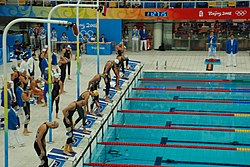Swimmers

Start of the 4 × 100 meters relay during the 2008 Summer Olympics in Beijing
|
|
| Highest governing body | FINA |
|---|---|
| First competitions | 1930s |
| Characteristics | |
| Contact | No |
| Team members | Teams or individuals |
| Venue | Swimming pools or open-water |
| Presence | |
| Country or region | Worldwide |
| Olympic | 1896 |
| World Championships | 1973 |
| Paralympic | 1960 |
Swimming is an individual or team sport and activity. Competitive swimming is one of the most popular Olympic sports, with events in butterfly, backstroke, breaststroke, freestyle, and individual medley. In addition to these individual events, Olympic swimmers also take part in relays. Swimmers can also compete in open-water events (e.g., in a sea or lake).
Evidence of recreational swimming in prehistoric times has been found, with the earliest evidence dating to Stone Age paintings from around 10000 years ago. Written references date from 2000 BC, with some of the earliest references to swimming including the Iliad, the Odyssey, the Bible, Beowulf, the Quran and others. In 1538, Nikolaus Wynmann, a German professor of languages, wrote the first swimming book, The Swimmer or A Dialogue on the Art of Swimming (Der Schwimmer oder ein Zweigespräch über die Schwimmkunst).
Swimming emerged as a competitive recreational activity in the 1830s in England. In 1828, the first indoor swimming pool, St George's Baths was opened to the public. By 1837, the National Swimming Society was holding regular swimming competitions in six artificial swimming pools, built around London. The recreational activity grew in popularity and by 1880, when the first national governing body, the Amateur Swimming Association, was formed, there were already over 300 regional clubs in operation across the country.
In 1844 two Native American participants at a swimming competition in London introduced the front crawl to a European audience. Sir John Arthur Trudgen picked up the hand-over stroke from some South American natives and successfully debuted the new stroke in 1873, winning a local competition in England. His stroke is still regarded as the most powerful to use today.
...
Wikipedia
